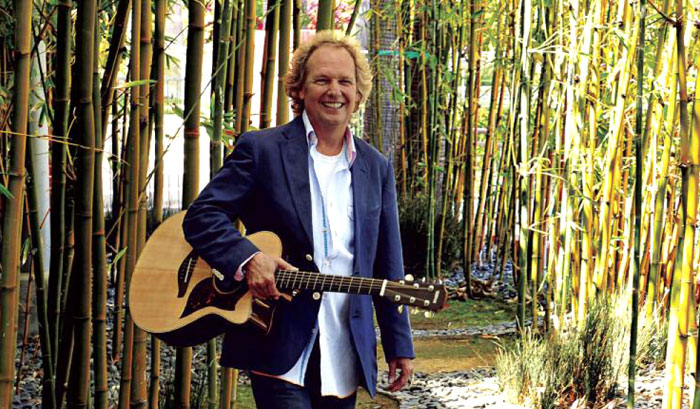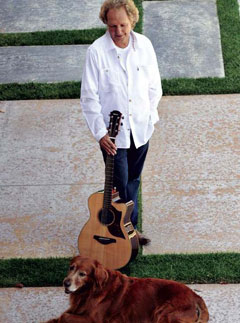


SINCE THE '70S LEE RITENOUR HAS PURSUED a dual career as a leading session player and a solo instrumentalist. His tasteful guitar work graces songs by artists from Michael Jackson to Henry Mancini, Steely Dan to Sinatra, while his solo discs have helped define the sound of smooth jazz.
We recently spoke to Ritenour about his latest and most ambitious project, 6 String Theory. Recorded to celebrate Lee's 50th year as a guitar player, the disc pairs Ritenour with many of his favorite contemporary players.

YOU COVER A LOT OF GROUND ON THIS ALBUM!
As a kid I loved all different kinds of guitar playing. So for this project I picked six genres, representing the six strings of the guitar: jazz, rock, blues, acoustic, classical, and country. I tried to pick some of the most legendary guitar players, people that I knew would collaborate well, like George Benson, B.B. King, John Scofield, Pat Martino, Mike Stern, Slash, Steve Lukather, Neil Schon, Vince Gill, Joe Bonamasa, Keb Mo', Taj Mahal, and Johnny Lang. I also wanted to include some of the young guitar players I've enjoyed watching on YouTube, like Andy McKee and Joe Robinson, two great acoustic players, and Guthrie Govan, an incredible fusion-rock shredder.
THE ALBUM ALSO INSPIRED A GUITAR CONTEST.
Yes. Yamaha helped me create a worldwide platform for people to enter this contest. We had over 500 entries from 40 countries. The winner was Shon Boublil, a 16-year-old classical guitarist from Montreal. We got him a four-year scholarship to Berklee, plus a Yamaha guitar endorsement.
IT'S SURPRISING YOU DIDN'T INCLUDE BRAZI L IAN MUSIC, CONSIDERING HOW IMPORTANT THAT STYLE HAS BEEN FOR YOU.
Yeah, it's been ingrained in me since I was a teenager. The gentle, rhythmic classical guitar comping behind most Brazilian music just got my fancy. I took a trip down there when I was 19 to check it out, and I met a lot of musicians. I wound up working with Sergio Mendes, and the sound has been in my blood ever since. [Laughs.] In fact, my son is half-Brazilian, so it's definitely in the blood!
YOU'VE BEEN PLAYING SOME NEW YAMAHA ACOUSTIC GUITARS.
Yes, the new A Series, which is fabulous. They're great guitars, and they're unique in the marketplace. Yamaha has custom shops in Japan that can build a very expensive, high-end classical guitar. On the other hand, they also have an inexpensive line priced for students.
Make sure you keep creating music, and loving it the same way you did as a kid.
The A Series is something in between. It's moderately priced, but it's great for live playing because they came up with a pickup design that samples different microphones. Pros like me can play it and get off on it, but an advanced student or young professional can pick one up and get tons of mileage out of it. It's very cool.
YOU'VE ALSO BEEN PERFORMING ON A YAMAHA SILENT GUITAR.
That's been a staple for a long time. There's no real body, so you can crank it as much as you want. It has a great hybrid tone-it's a bit electric-sounding, but also acoustic-like with its nylon strings and piezo pickup. I always recommend it to parents who want to get their kids started on guitar. It doesn't hurt the fingers, it's not too expensive, and you can practice with headphones. It's a nice ax.
WHAT KEEPS YOU ENGAGED WITH THE GUITAR AFTER HALF A CENTURY?
Well, it's a very difficult business, so you have to learn to separate the music from the business. The answer isn't to hire somebody to take care of the business and look the other way-you have to learn to wear both hats. On the other hand, you have to be able to turn off that business valve and make sure you keep creating music and loving it the same way you did as a kid.
THE BUSINESS HAS CHANGED A LOT SINCE YOU STARTED OUT.
The business has changed radically. Record companies are not giving away big contracts, and it's harder to get studio work. A TV show used to have 30 musicians on the stage every week. Now it's one guy in his bedroom.
ANY SURVIVAL TIPS?
Versatility is the key to survival in the music business. The more you learn about music, about playing different styles, about arranging, production, composition, publishing, and business, the better off you'll be. One thing I've noticed about the more entrepreneurial young musicians is that at some point they look deep into themselves and ask, "What do I do best? Am I better onstage or behind the scenes? Am I more of a composer, arranger, and producer? Am I a shredder or more of an accompaniment player?" Whatever the thing is that you do best, beef that up. Then find a way to make your thing fit into the music business-or make the music business fit into your thing. If you're sharp and creative and know how to hustle, you can almost always create your own road.
(Photography Credit: Rob Shanahan)
























